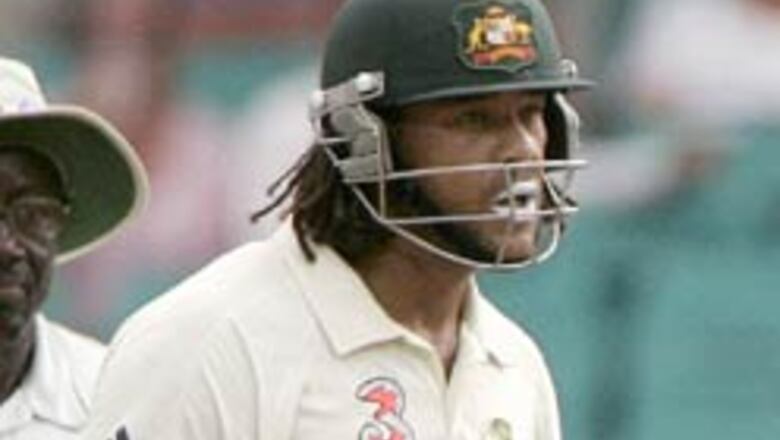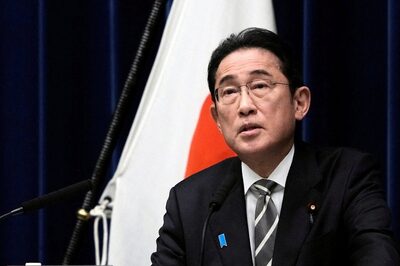
views
Melbourne: After Adam Gilchrist and Ricky Ponting, it is now Andrew Symonds' turn to reopen the old wounds of "monkeygate" claiming he was cocksure of Harbhajan Singh first calling him "monkey" in Mumbai last year before the Indian offie's alleged repeat of the same abuse in Sydney three months later.
Writing in his book Roy on the Rise: A Year of Living Dangerously, co-authored with Stephen Gray and to hit the stands on Sunday, Symonds also questioned judge John Hansen's decision to downgrade suspension of Harbhajan though he conceded his behaviour exacerbated the situation.
"Whether it was Aussies suck or Aussies are a**holes, it was clear who the villains were in this stadium (Wankhede)," Symonds writes about the day he said the monkey chants started in Mumbai on October 17, 2007 during the seventh and last ODI.
"The monkey chants were around too. Although some people in authority were aware that it was getting out of hand, others continued to hide behind the line that it was all a cultural misunderstanding and that the chants were merely celebrating the monkey god.
"... our team couldn't hide this disbelief at this - 'What particular God is called a**hole in this country?'
"The frustration levels in the camp were rising and I was conscious of contributing to the pressure on the team. It was another turbulent match. I was out for a first-ball duck. I trudged off, getting darker at the world by the second as monkey chants boomed out around Wankhede Stadium," Symonds said, according to excerpts which appeared in Herald Sun.
"Things took a sharp turn for the worse during the Indian innings. Harbhajan and I locked horns briefly in the 35th over and that's when he chucked the 'monkey' word at me. I didn't have to be Einstein to work out what he was referring to."
PAGE_BREAK
Symonds said he later met Harbhajan in the Indian dressing room and the offie apologised, a view supported by Ricky Ponting in his just-published Captain's Diary 2008.
"India won the game, and afterward the team had a brief discussion about whether a formal charge should be laid against Harbhajan.
"But I was keen to try to deal with it there and then and went along to their dressing-room and asked to speak with Harbhajan. I basically told him: 'Look, the name-calling is fine with me, it doesn't particularly worry me what you call me, but you know what is going to happen. One thing will lead to another and you blokes will end up going to an umpire and it will get out of hand'.
"I said that the word he used was offensive and hurtful and he apologised and said it wouldn't happen again. We shook hands and I said: 'That's the end of it'. As it turned out, Harbhajan would later deny this conversation took place, but my recollection is about as clear as I can be on the event.
"So what does it mean, being called a monkey? There were times when I couldn't give a monkey's. If an individual calls me that, that shows he doesn't respect me as a person and it is up to me and him to sort it out.
"If a crowd does it - well, I can't talk to every one of them, can I? All I can rely on is that enough people know it is out of line. There are better ways to support your team than to denigrate individuals based on their colour.
"I've said before that I'm not sensitive about the whole colour issue for myself - I really don't give a squirt. I know who I am and I'm comfortable with myself. But that's me - I know it's different for others, and again I don't back off from saying that there's no way racism belongs in sport, or society for that matter."
Recalling the appeal hearing in Adelaide, Symonds said backroom politics played a part in downgrading Harbhajan's suspension and lashed out at the ICC for failing to provide Judge Hansen Harbhajan's full disciplinary record.
PAGE_BREAK
"The appeal hearing in Adelaide wasn't the most enjoyable day of my life, not for any of the participants, I expect. As for the final outcome - Harbhajan's ban was overturned - I reckon most right-minded people would argue that Judge Hansen didn't get the result right, although he could only make the decision based on the information he had been provided.
"The ICC let him down badly by failing to provide him with Harbhajan's full disciplinary record, and their laxness meant it was an unsatisfactory end - in my eyes anyway."
He said he stood by his evidence that "a Test match is no place to be friendly with the opposition" which was criticised by judge Hansen in his judgment.
"The judge found that I had provoked the incident by my approach towards Harbhajan, and in his findings, he criticised my evidence that a Test match is no place to be friendly with the opposition.
"Sorry mate, I stand by that statement. Ideally, you play cricket hard on field and give the opposition nothing. But I'm always prepared to leave it on field when I walk off. In the rooms and away from the venue, I believe you treat the opposition with respect and acknowledge they are professionals and skilled athletes. Not everyone is going to be bosom buddies in competitive sport."
Symonds said after this controversy, he contemplated quitting the game, not because he was no longer passionate about cricket but he couldn't handle the off-field politics.
"By the end of the season, I didn't want to see another cricket ball or bat. I had had enough - I was physically tired and mentally worn down," he wrote.




















Comments
0 comment